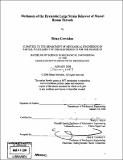Mechanics of the hysteretic large strain behavior of mussel byssus threads
Author(s)
Greviskes, Brian
DownloadFull printable version (15.17Mb)
Other Contributors
Massachusetts Institute of Technology. Dept. of Mechanical Engineering.
Advisor
Mary C. Boyce.
Terms of use
Metadata
Show full item recordAbstract
Many biological materials have been shown to demonstrate remarkable physical properties, outperforming even the most widely-used synthetics. This study investigates mussel byssal threads, the attachment appendage of aquatic mussels, which are here shown to exhibit a remarkable ability to withstand very large resilient yet dissipative stretches (A > 4) without failing. These threads were dissected into separate regions: proximal (proximal to the mussel) and distal; the sections were then tested in tension in both monotonic and cyclic tests at varying nominal strain rates. These tests demonstrated that each section displayed different properties, and that the behavior of each section was dependent on that section's microstructure. This microstructure, as demonstrated by Hassenkam et. al. (2004), consists of tiny banana-shaped filament bundles, with molecular folded domain ends. It is demonstrated that as the thread is stretched these bundles straighten and the ends unfold, increasing the tension-free length of the filaments. Further stretching is required to load this new length and to release more of the folded domains. Upon unloading these bundles refold, with the refolding being time dependent i.e. as more time elapses between unloading and reloading more of the domains refold. A model for the stress-strain behavior of the threads, based mainly upon this unfolding, is developed. This model captures both the rate-dependence of the material and the thread behavior in loading, unloading, and reloading for both the distal and proximal thread section.
Description
Thesis (S.B.)--Massachusetts Institute of Technology, Dept. of Mechanical Engineering, 2008. Includes bibliographical references (p. 70-71).
Date issued
2008Department
Massachusetts Institute of Technology. Department of Mechanical EngineeringPublisher
Massachusetts Institute of Technology
Keywords
Mechanical Engineering.